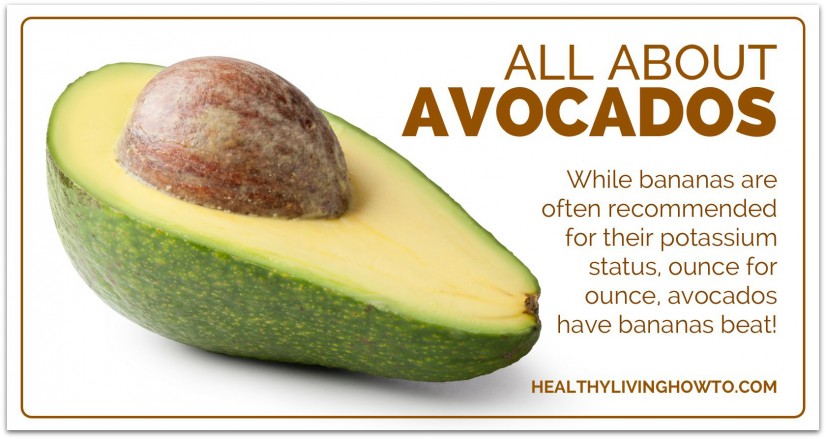The avocado comes from a tree native to Central Mexico. While it is common to refer to the avocado as a vegetable, botanically speaking it is a fruit.
Avocados were known to the Aztecs as “the fertility fruit”.[1] The most well-known variety of avocado is Hass. Commonly grown in California, the Hass avocado makes up about 95% of the avocado crop in the United States and is available year-round.
Other varieties include Fuerte, also known as Florida avocados, Cocktail avocados which have no pit and there is even a Bacon variety. [2]
Avocados have a smooth buttery texture and can be enjoyed a number of ways. Proper storage and preparation are important to not only enjoying the taste of the avocado but deriving the nutritional benefits as well.
All About Avocados
1. The majority of avocados' calories come oleic acid, a monounsaturated fat (MUFA), similar to the fat found in olives and olive oil. MUFAs may improve insulin sensitivity[3] and play a role in the prevention of metabolic syndrome and type II diabetes.
2. Avocados are a good source of the mineral potassium which is essential for the proper functioning of the heart, kidneys, muscles, nerves and digestive system. While bananas are often recommended for their potassium status, ounce for ounce, avocados have bananas beat. Per ounce, bananas have 100 mg of potassium, meanwhile, avocados have 144 mg.[4] In addition to potassium, avocados are also rich in magnesium, an essential mineral that most Americans don't get enough of.[5]
3. The carotenoids lutein and zeaxanthin are concentrated in the macular region of the retina and the eye lens, where they protect the eyes from harmful ultraviolet light as well as maintaining eyesight as we age.[6] An ounce of avocado has 81 micrograms of lutein and zeaxanthin and is a good way to get more lutein in the diet. Other carotenoids, or plant compounds that are important to human health, found in avocados are, alpha-carotene, beta-carotene and beta-cryptoxanthin.
4. Inadequate levels of B6 and B9 in the diet is related to higher homocysteine levels which is an independent risk factor for cardiovascular disease.[7] Avocados are a good source of both of these B vitamins.
5. Avocados are a good source of vitamin K, which plays a role in blood and bone function. Vitamin K allows the blood to clot, protects the bones from fracture, prevents postmenopausal bone loss and helps prevent calcification of the arteries.[8]
6. Phytosterols are plant-derived compounds which have been found to block cholesterol absorption in the intestine. This can potentially lead to a reduced risk of heart disease and stroke.[9] Three phytosterols found in avocado include, beta-sitosterol, camposterol and sigmasterol.
7. Vitamin C and vitamin E found in avocados are potent antioxidants that combat cellular aging and give our immune system a boost.[10]
8. Avocados do not ripen on the tree. They are picked unripe while the skin is still a bright green. The color of the skin changes from green to dark green and sometimes to black as the avocado ripens. Ripeness is ultimately determined by a firm pressure, color can sometimes be misleading as avocado “softening” can occur at a varying rate, independent of the color.[11] A ripe avocado “gives” slightly under gentle pressure. Let avocados ripen on the counter and then refrigerate to halt the ripening process.
9. Avocados made the EWG's 2012 Shopper's Guide to Pesticides in Produce™ “Clean 15 List”. This list includes the produce least likely to test positive for pesticide residues. “Avocados had no detectable pesticide residues on 98% or more of the samples tested.”[12]
10. One 30 g (1 oz) serving of Hass avocado, has 50 calories, 4.5 g fat, 3 g carbohydrate, 2 g fiber and <1 g protein. At 1 g NET CARB per serving this makes avocados the perfect fruit for those living a low-carb lifestyle.
Healthy Living How To Recommends
How To Pick The Perfect Avocado
Healthy Recipe: Avocado Peach Salsa
Healthy Recipe: Guacamole
